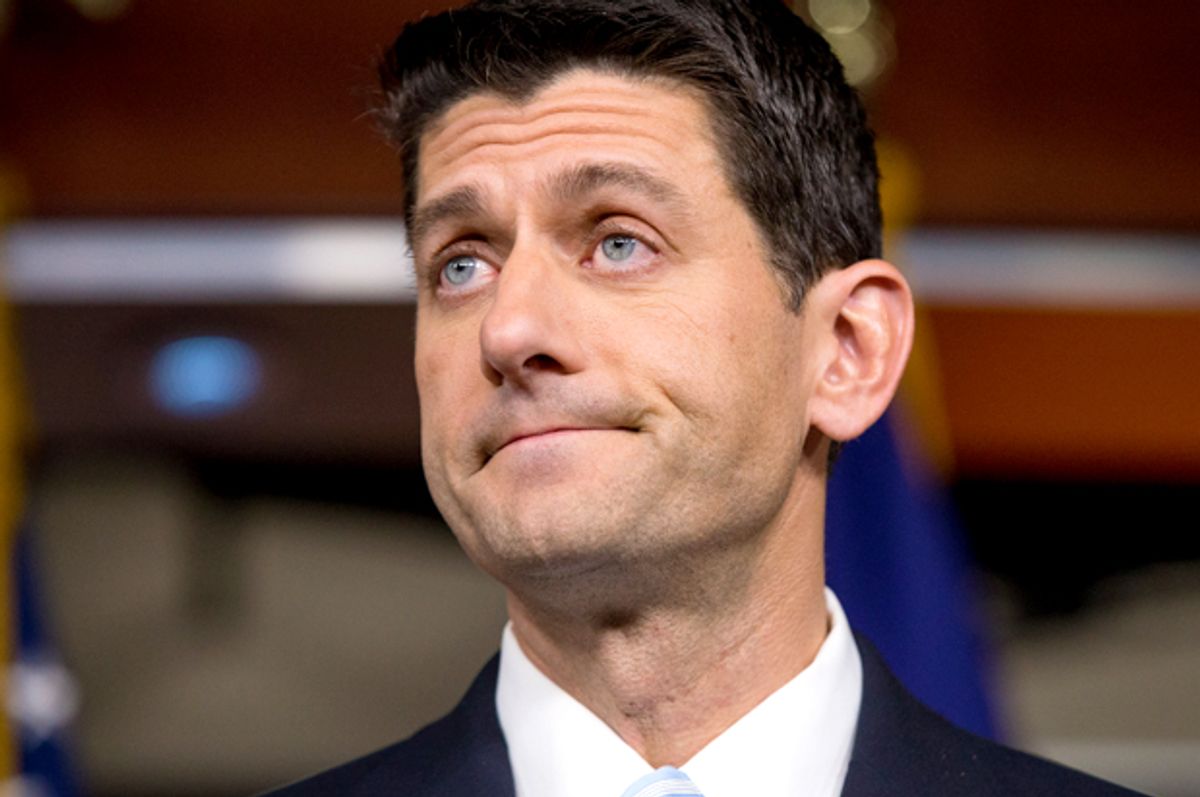There have been two Republican presidential debates thus far, and neither featured any serious discussion of poverty, the welfare state, or the candidates’ plans to address the problems facing low-income people. There’s been plenty of talk about tax cuts and spending cuts and how they’ll combine to trigger unheard-of levels of economic growth, but no specific discussion of what the candidates would do within the existing policy framework to improve the lives of people living below the poverty line. The moderators of tonight’s CNBC debate should fill this void in the policy discussion – it’s long overdue as it is, but the issues of poverty and the welfare state are especially relevant to the Republican primary now that Paul Ryan is positioned to become the next Speaker of the House.
Ryan, you may recall, refashioned himself as an anti-poverty warrior after he and Mitt Romney failed to win the White House in 2012. The anti-poverty plan that emerged from Ryan’s long policy incubation period represented an evolution in his thinking. His much-celebrated budget documents from previous years would have inflicted ruinous cuts on the social safety net in order to finance tax cuts for the wealthy and increased military spending, but the Ryan poverty plan accepted the continued existence of social welfare programs, albeit with severe and debilitating changes.
The centerpiece of Ryan’s anti-poverty vision are “opportunity grants,” in which the federal funding for several different welfare programs would be bundled together and sent to the states in one lump sum to encourage “innovation” and “accountability.” Such arrangements are typically referred to as “block grants,” but “opportunity grant” sounds nicer and more free-markety, so that’s what Ryan went with.
Block grants for anti-poverty programs have been a staple of conservative welfare reform proposals since forever, but they don’t actually do anything to reduce poverty. Back in 1996, the Clinton administration and the Republican-controlled Congress passed the Personal Responsibility and Work Opportunity Reconciliation Act – the “welfare reform” measure Republicans like John Kasich so often boast of. One of the key features of that bill was the Temporary Assistance for Needy Families (TANF) program, a block-granted anti-poverty measure.
The New York Times published an excellent piece yesterday tracking the disintegration of TANF as an effective anti-poverty tool in Arizona. Put simply, the “flexibility” afforded to the state in administering the program ended up providing it with the means and the incentive to boot people off the rolls and redirect the money elsewhere, which has rendered the program effectively useless. “Ending the poor’s entitlement to government aid is counted as a success because it has reduced the rolls of people on welfare,” the Times noted. “But that is not the same as helping the poor get a job, overcome dependency and climb out of poverty. Welfare was essentially made irrelevant to the lives of the poor. It is meager yet increasingly difficult to get.”
But block-granting mania continues unabated. The last Republican budget document envisioned transforming Medicaid into a block-granted program – no, wait, I’m sorry, the egregiously message-tested term it used was “State Flexibility Funds.” CNBC’s John Harwood – who will be moderating the debate! – noted earlier this month that Republicans generally agree that block-granting Medicaid is a terrific idea. Jeb Bush’s healthcare plan calls for it, and Marco Rubio has proposed block-granting pretty much every part of the safety net.
The problem is the same one that’s plagued TANF – block-granting is tantamount to a massive cut that would dump people from the rolls without actually lifting them out of poverty. As the Center on Budget and Policy Priorities noted earlier this year when the Republican budget was released, block-granting Medicaid would “cause a drop in enrollment of between 25 percent and 35 percent. The Urban Institute also estimated that the block grant likely would have caused cuts in reimbursements to health care providers of more than 30 percent by the tenth year.”
With Paul Ryan in the Speaker’s chair and a Republican president in office, it seems likely that Medicaid and other safety net programs would find themselves targets of the block-granting push, which is essentially a sneak attack on the welfare state. Harwood and the other CNBC moderators should challenge the 2016 Republican hopefuls on their plans for the safety net and finally shed a little light on what the GOP has in store for the nation’s poor and less fortunate.

Shares